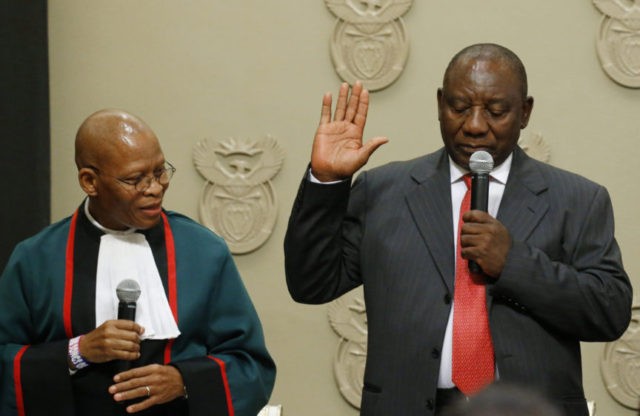Cyril Ramaphosa, the head of South Africa’s majority African National Congress (ANC) party, was elected president on Thursday just hours after President Jacob Zuma resigned.
EWN News jokes that Ramaphosa literally hit the ground running, as he was spotted jogging and posing for photos with passersby on Thursday morning:
Ramaphosa was elected by a vote of the National Assembly and confirmed in office by South African Chief Justice Mogoeng Mogoeng. He will hold the position of president temporarily until a general election can be held next year.
No other candidate was nominated to oppose him, but he did not receive unanimous support; members of the opposition Economic Freedom Fighters, for example, walked out of the assembly chamber in protest. Several other opposition parties called for the parliament to be dissolved entirely and replaced in early elections.
On the other hand, the South African stock market jumped four percent and had its best day in two years after Zuma’s resignation and Ramaphosa’s confirmation brought some stability to the political scene. At the moment, the “Zuma is gone” part of that equation is probably responsible for most of the euphoria. It will be up to Ramaphosa to sustain it.
Ramaphosa was deputy president as well as head of the ANC. Before that, he was a businessman, trade union leader, and chief negotiation for Nelson Mandela. He was Mandela’s choice to lead the ANC after his presidency but lost the election to Thabo Mbeki, who went on to become president in 1999. Ramaphosa’s success in the business world after his departure from politics was a rags-to-riches story that greatly increased his popularity, allowing him to return to the ANC as one of the richest men in South Africa and break Zuma’s grip on party leadership—the first domino to topple in Zuma’s ultimate downfall.
The more skeptical observers in South Africa note that Zuma came to power after a similar tumble by Mbeki, who had worn out his welcome after three terms as leader of the ANC and was pushed into resigning his presidency by the party.
Ramaphosa sought to allay those fears by stressing his anti-corruption platform in his inaugural address on Thursday and promising to work with all political parties instead of relying on the ANC’s strength to steamroll the opposition.
“I will come to this house on a regular basis to exercise accountability,” he promised his parliament. “I will try very hard not to disappoint the people of South Africa.”
He could not, however, resist a little dig at opposition leader Mmusi Maimane’s feisty promise to meet him at the ballot box during the upcoming general election. “Let’s deal with the current moment, rather than grandstanding,” Ramaphosa responded.
Maimane, who leads the Democratic Alliance party, had more on his mind than merely promising a spirited run against Ramaphosa himself. He voiced concerns about the corruption within the African National Congress, complained that the party and its special interests have “captured” vital institutions of the state, and insisted it could not be cleansed simply by booting Zuma and replacing him with the next ANC leader in line for the presidency.
“We don’t have a Zuma problem. We have an ANC problem,” Maimane declared on Wednesday. “The ANC can’t come now and say by offering a sacrificial lamb of Jacob Zuma, it somewhat absolves them of all their sins.”
Ramaphosa will only be the fourth democratically-elected leader of South Africa if he wins the general election. Australia’s ABC News sums up the challenges facing him:
South Africa’s economy is faltering: Two of the leading credit rating agencies have downgraded the country’s debt to junk status, growth is paltry, corruption is rife, many state-run companies have been looted, and the official unemployment rate sits at just under 27 per cent but is likely higher due to the vast numbers of undocumented immigrants.
Under Mr. Zuma, calls for radical economic transformation became louder, but there is little agreement on what exactly the phrase means.
It is now up to Mr. Ramaphosa to take carriage of those discussions.
ABC predicts the same business career that helped Ramaphosa build a $450 million fortune and position himself as the candidate who can repair South Africa’s broken economy may also come back to haunt him, particularly an incident involving the police killing 34 striking miners in the “Marikana Massacre” of 2012. He also faces growing public disenchantment with the ANC over not only corruption, but also ineptitude and broken promises.
“It is hard to overlook the fact that for many South Africans life under ANC rule is not dissimilar to life during apartheid,” ABC writes. “If Mr. Ramaphosa is to change that, his mentor’s vision may not be enough. He will also need to search deep within the soul of the ANC, and tackle some of the ruling party’s own demons.”

COMMENTS
Please let us know if you're having issues with commenting.